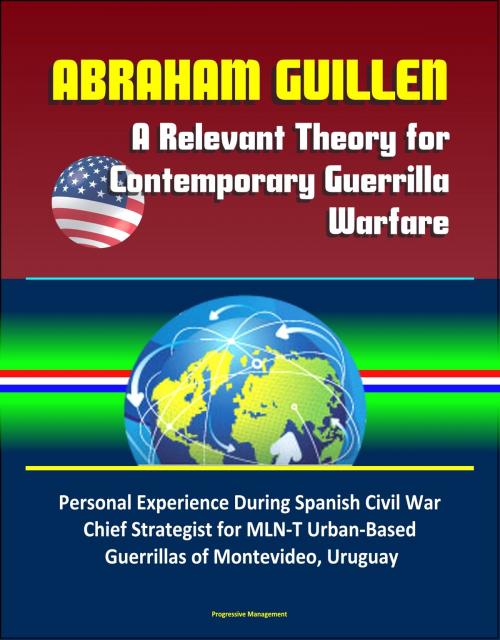Abraham Guillen: A Relevant Theory for Contemporary Guerrilla Warfare – Personal Experience During Spanish Civil War, Chief Strategist for MLN-T Urban-Based Guerrillas of Montevideo, Uruguay
Nonfiction, History, Military, Strategy, Social & Cultural Studies, Political Science| Author: | Progressive Management | ISBN: | 9781370662005 |
| Publisher: | Progressive Management | Publication: | February 25, 2017 |
| Imprint: | Smashwords Edition | Language: | English |
| Author: | Progressive Management |
| ISBN: | 9781370662005 |
| Publisher: | Progressive Management |
| Publication: | February 25, 2017 |
| Imprint: | Smashwords Edition |
| Language: | English |
This excellent report has been professionally converted for accurate flowing-text e-book format reproduction. Abraham Guillen's theory on urban guerilla warfare marked a significant evolution from popular theories on guerrilla warfare during the late 1960s. Guillen's theory developed from his personal experience during the Spanish Civil War and bore the deep influence of the popular theories of guerrilla warfare, including Mao Tse-tung's protracted popular war and Ernesto "Che" Guevara's foquismo theory. Guillen's theory became very influential within Latin America from the mid-1960s to the early 1970s. His writings, most notably the Strategy of the Urban Guerrilla, also influenced guerrillas in the United States, Europe, Japan, and the Middle East. However, not much has been written about Guillen's theory. Indeed, urban guerrilla theories in general have been discredited as a concept that has never succeeded in practice. Despite the general lack of research devoted to him, it is still worthwhile determining the strengths and weaknesses of Guillen's theory on urban guerrilla warfare and to explore the implications of his theory. This is especially so when considering the forecasted trends that will shape the complex environment, such as megacities, United States forces are likely to operate within in the future. Abraham Guillen's theory of urban guerrilla warfare provides a relevant blueprint for guerrilla warfare in the contemporary operating environment and understanding it more fully will become increasingly useful for counterinsurgents in the future.
At the height of the development of guerrilla warfare theory in 1971, RAND analyst Brian M. Jenkins stated, "no great theorist of urban guerrilla warfare has appeared. There is no Mao of the city." To be sure, Abraham Guillen may not be as influential as Mao Tse-tung, however his theory on guerilla warfare marked a significant evolution from popular theories during the late 1960s, fusing the classic rural strategy with the urban strategy. Guillen's theory developed from his personal experience during the Spanish Civil War and bore the deep influence of the popular theories of guerrilla warfare, including Mao Tse-tung's protracted popular war and Ernesto "Che" Guevara's foquismo theory. However, not much has been written about Guillen's theory. Indeed, urban guerrilla theories in general have been discredited as a concept that has never succeeded in practice. Despite Jenkins's dismissal of Guillen and the general lack of research devoted to him, it is still worthwhile determining the strengths and weaknesses of Guillen's theory on urban guerrilla warfare and to explore the implications of his theory. This is especially so when considering the forecasted trends that will shape the complex environment, such as megacities, United States forces are likely to operate within in the future. Abraham Guillen's theory of urban guerrilla warfare provides a relevant blueprint for guerrilla warfare in the contemporary operating environment and understanding it more fully will become increasingly useful for counterinsurgents in the future.
This excellent report has been professionally converted for accurate flowing-text e-book format reproduction. Abraham Guillen's theory on urban guerilla warfare marked a significant evolution from popular theories on guerrilla warfare during the late 1960s. Guillen's theory developed from his personal experience during the Spanish Civil War and bore the deep influence of the popular theories of guerrilla warfare, including Mao Tse-tung's protracted popular war and Ernesto "Che" Guevara's foquismo theory. Guillen's theory became very influential within Latin America from the mid-1960s to the early 1970s. His writings, most notably the Strategy of the Urban Guerrilla, also influenced guerrillas in the United States, Europe, Japan, and the Middle East. However, not much has been written about Guillen's theory. Indeed, urban guerrilla theories in general have been discredited as a concept that has never succeeded in practice. Despite the general lack of research devoted to him, it is still worthwhile determining the strengths and weaknesses of Guillen's theory on urban guerrilla warfare and to explore the implications of his theory. This is especially so when considering the forecasted trends that will shape the complex environment, such as megacities, United States forces are likely to operate within in the future. Abraham Guillen's theory of urban guerrilla warfare provides a relevant blueprint for guerrilla warfare in the contemporary operating environment and understanding it more fully will become increasingly useful for counterinsurgents in the future.
At the height of the development of guerrilla warfare theory in 1971, RAND analyst Brian M. Jenkins stated, "no great theorist of urban guerrilla warfare has appeared. There is no Mao of the city." To be sure, Abraham Guillen may not be as influential as Mao Tse-tung, however his theory on guerilla warfare marked a significant evolution from popular theories during the late 1960s, fusing the classic rural strategy with the urban strategy. Guillen's theory developed from his personal experience during the Spanish Civil War and bore the deep influence of the popular theories of guerrilla warfare, including Mao Tse-tung's protracted popular war and Ernesto "Che" Guevara's foquismo theory. However, not much has been written about Guillen's theory. Indeed, urban guerrilla theories in general have been discredited as a concept that has never succeeded in practice. Despite Jenkins's dismissal of Guillen and the general lack of research devoted to him, it is still worthwhile determining the strengths and weaknesses of Guillen's theory on urban guerrilla warfare and to explore the implications of his theory. This is especially so when considering the forecasted trends that will shape the complex environment, such as megacities, United States forces are likely to operate within in the future. Abraham Guillen's theory of urban guerrilla warfare provides a relevant blueprint for guerrilla warfare in the contemporary operating environment and understanding it more fully will become increasingly useful for counterinsurgents in the future.















